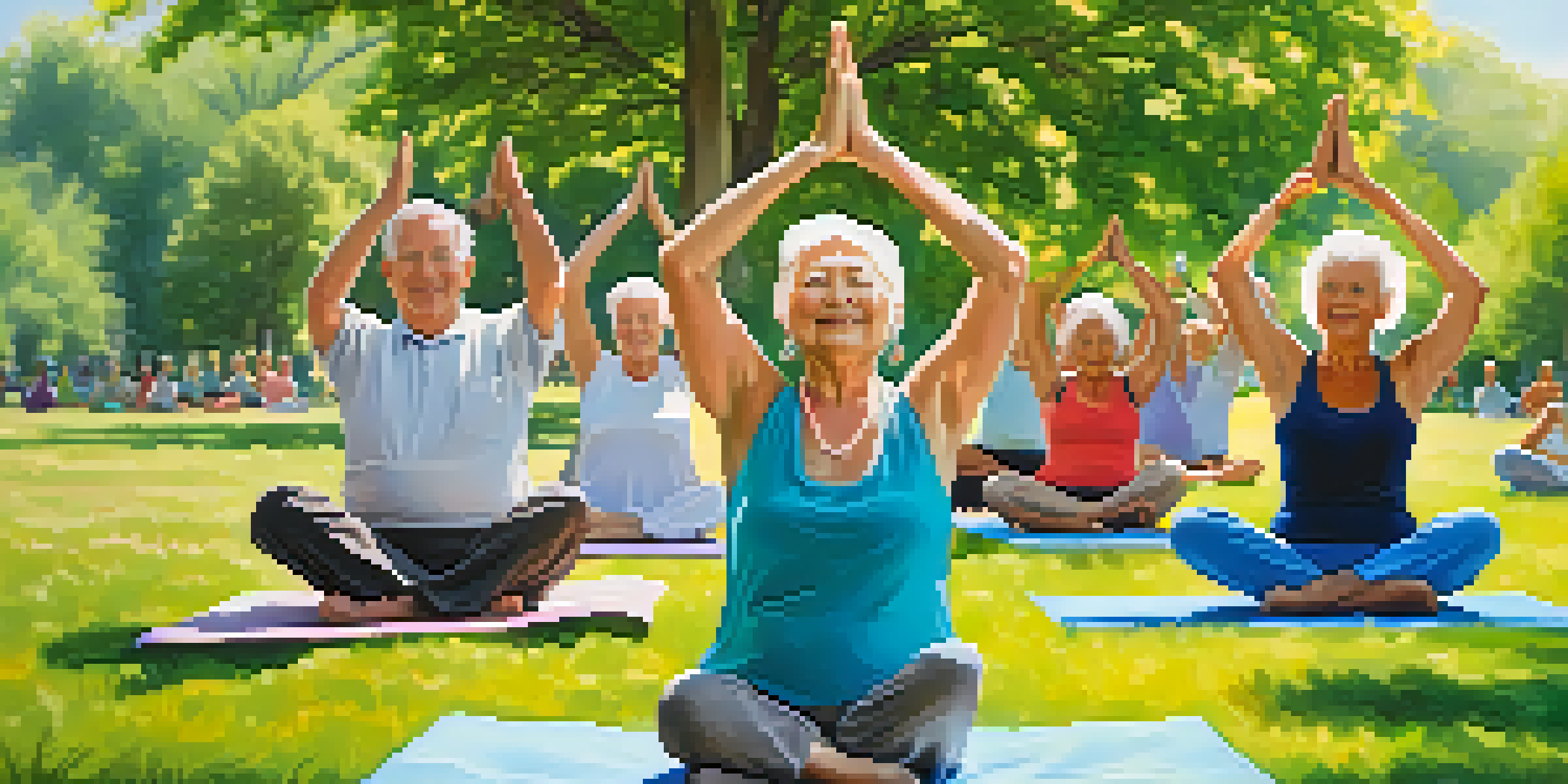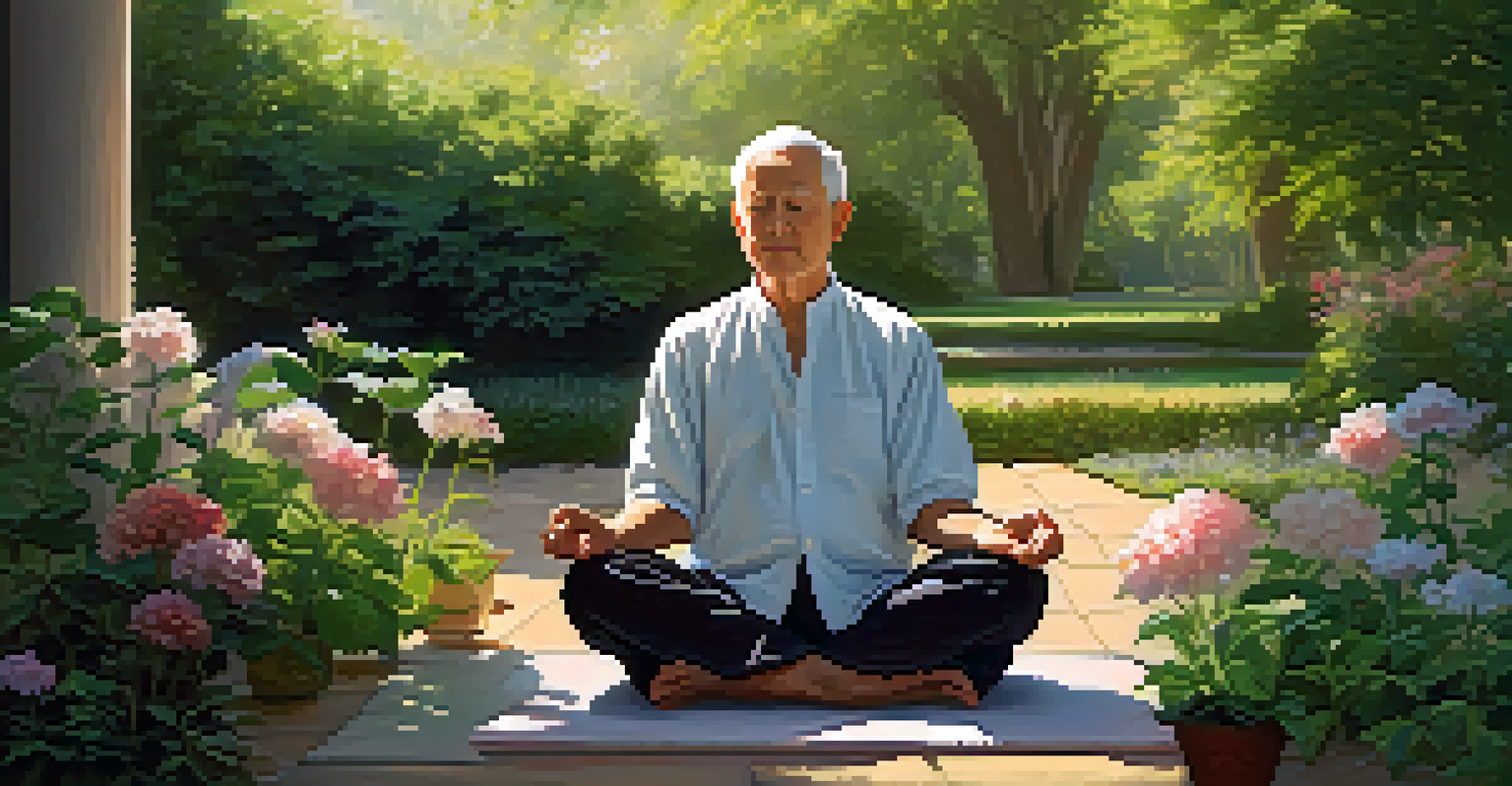The Connection Between Mental Health and Aging Well

Understanding Mental Health in the Context of Aging
Mental health is a critical aspect of overall well-being, especially as we age. It encompasses our emotional, psychological, and social well-being, influencing how we think, feel, and act. As we grow older, maintaining mental health can significantly affect our ability to cope with the physical and emotional changes that accompany aging.
Mental health is not a destination, but a process. It's about how you drive, not where you're going.
For many seniors, mental health challenges such as depression or anxiety may arise due to various stressors, including health issues, loss of loved ones, or social isolation. These factors can hinder not just mental wellness but also physical health, making it essential to pay attention to the mind as we age. Understanding this connection is the first step toward promoting a healthier, more fulfilling life in our later years.
Moreover, recognizing the signs of mental health issues early can lead to timely interventions. Whether it's seeking therapy, engaging in social activities, or simply talking with family, taking proactive steps is crucial. Ultimately, a healthy mind fosters resilience, enabling older adults to navigate the complexities of aging with grace.
The Impact of Social Connections on Mental Health
Social connections play a vital role in maintaining mental health as we age. Engaging in meaningful relationships can help reduce feelings of loneliness and isolation, which are common challenges for seniors. This sense of belonging not only boosts mood but also enhances cognitive function, creating a positive feedback loop that supports overall well-being.

Consider the example of community centers or clubs where older adults gather to share experiences, hobbies, or even just a cup of coffee. These environments foster friendships that can lead to emotional support and shared laughter, both of which are essential for mental health. The more we connect with others, the more we reinforce our sense of purpose and joy in life.
Mental Health is Vital for Seniors
Maintaining mental health is crucial for older adults as it significantly impacts their overall well-being and ability to cope with aging challenges.
Conversely, a lack of social interaction can lead to increased risks of mental health issues. It’s important for seniors to prioritize their social life, whether through family gatherings, volunteering, or participating in local events. Building and maintaining these connections can significantly impact how well we age mentally and emotionally.
Physical Activity: A Pillar of Mental Wellness
There's a strong link between physical activity and mental health, especially for older adults. Regular exercise not only improves physical health but also releases endorphins, which are natural mood lifters. Activities like walking, swimming, or dancing can reduce symptoms of anxiety and depression, making them crucial for aging well.
The greatest weapon against stress is our ability to choose one thought over another.
For example, consider a group of seniors who meet every week for yoga classes. This routine not only keeps their bodies fit but also provides an opportunity for social engagement. They share stories, encourage each other, and enjoy the mental clarity that comes from physical movement, showcasing the holistic benefits of staying active.
Moreover, incorporating physical activity into daily routines doesn’t have to be daunting. Simple changes, like taking the stairs instead of the elevator or gardening, can make a significant difference. Embracing these habits contributes not only to physical health but also to a more positive mindset as we age.
Nutrition's Role in Mental Health for Seniors
Nutrition plays a pivotal role in mental health, particularly for older adults. A balanced diet rich in nutrients can help support brain function and emotional well-being. Foods high in omega-3 fatty acids, antioxidants, and vitamins can enhance mood and cognitive performance, making meal choices a vital aspect of aging well.
For instance, incorporating more fruits, vegetables, and whole grains into daily meals can provide the necessary nutrients for both body and mind. Seniors who prioritize their diet often report feeling more energetic and mentally sharp, which enhances their quality of life. It’s about fueling the body with the right ingredients to promote mental clarity and emotional stability.
Social Connections Boost Well-Being
Engaging in meaningful relationships helps reduce loneliness and enhances cognitive function, supporting better mental health in seniors.
Additionally, staying hydrated is equally important, as dehydration can lead to confusion and mood swings. Encouraging older adults to drink plenty of water and maintain a healthy diet can make a world of difference in their mental health. Ultimately, good nutrition is a powerful tool for fostering resilience in the aging process.
The Importance of Mental Health Awareness
Raising awareness about mental health issues in older adults is crucial for fostering supportive communities. Many seniors may feel stigmatized or reluctant to seek help, believing that mental health challenges are simply a part of aging. Educating families, caregivers, and communities about these issues can create a more understanding and supportive environment.
For example, sharing stories of successful mental health management can inspire others to seek help. Whether it’s through therapy, support groups, or medication, knowing that they are not alone can empower seniors to take charge of their mental health. Awareness campaigns can also highlight the importance of regular mental health check-ups, just like physical health screenings.
Creating open dialogues about mental health not only helps reduce stigma but also encourages proactive measures. By promoting mental wellness as a priority in aging, we can help seniors feel valued and supported, ultimately leading to healthier, happier lives.
The Role of Mindfulness and Relaxation Techniques
Mindfulness and relaxation techniques have gained popularity for their benefits in managing stress and enhancing mental health. Practices such as meditation, deep breathing, and yoga can help older adults remain grounded and calm amid life’s challenges. These techniques encourage self-awareness, allowing individuals to process their emotions more effectively.
Imagine an older adult who starts each day with a few minutes of meditation. This simple act can set a positive tone for the day, reducing anxiety and fostering a sense of peace. Engaging in mindfulness not only improves emotional resilience but also enhances cognitive function, making it easier to navigate the complexities of aging.
Nutrition Supports Mental Clarity
A balanced diet rich in nutrients is essential for older adults, as it fosters brain function and emotional stability.
Incorporating these practices into daily routines can be incredibly beneficial. Whether it’s through guided meditation apps or local classes, the key is consistency. By prioritizing mindfulness, seniors can cultivate a healthier mind, which is essential for aging gracefully.
Seeking Professional Help: A Key to Mental Wellness
For many seniors, seeking professional help can be a turning point in their mental health journey. Whether it's talking to a therapist, joining a support group, or consulting a psychiatrist, professional guidance offers essential tools and strategies to cope with challenges. It’s important to view seeking help as a sign of strength, rather than weakness.
Consider a senior who initially hesitates to reach out for help due to feelings of stigma. After a few sessions with a therapist, they find clarity and support, enabling them to navigate their emotions more effectively. This illustrates how professional help can lead to positive changes, enhancing not only mental health but overall quality of life.

Additionally, mental health professionals can offer tailored advice and resources based on individual needs. Regular check-ins with professionals can help monitor progress and adjust strategies as needed. Ultimately, seeking help is a proactive step towards ensuring a fulfilling and healthy aging experience.